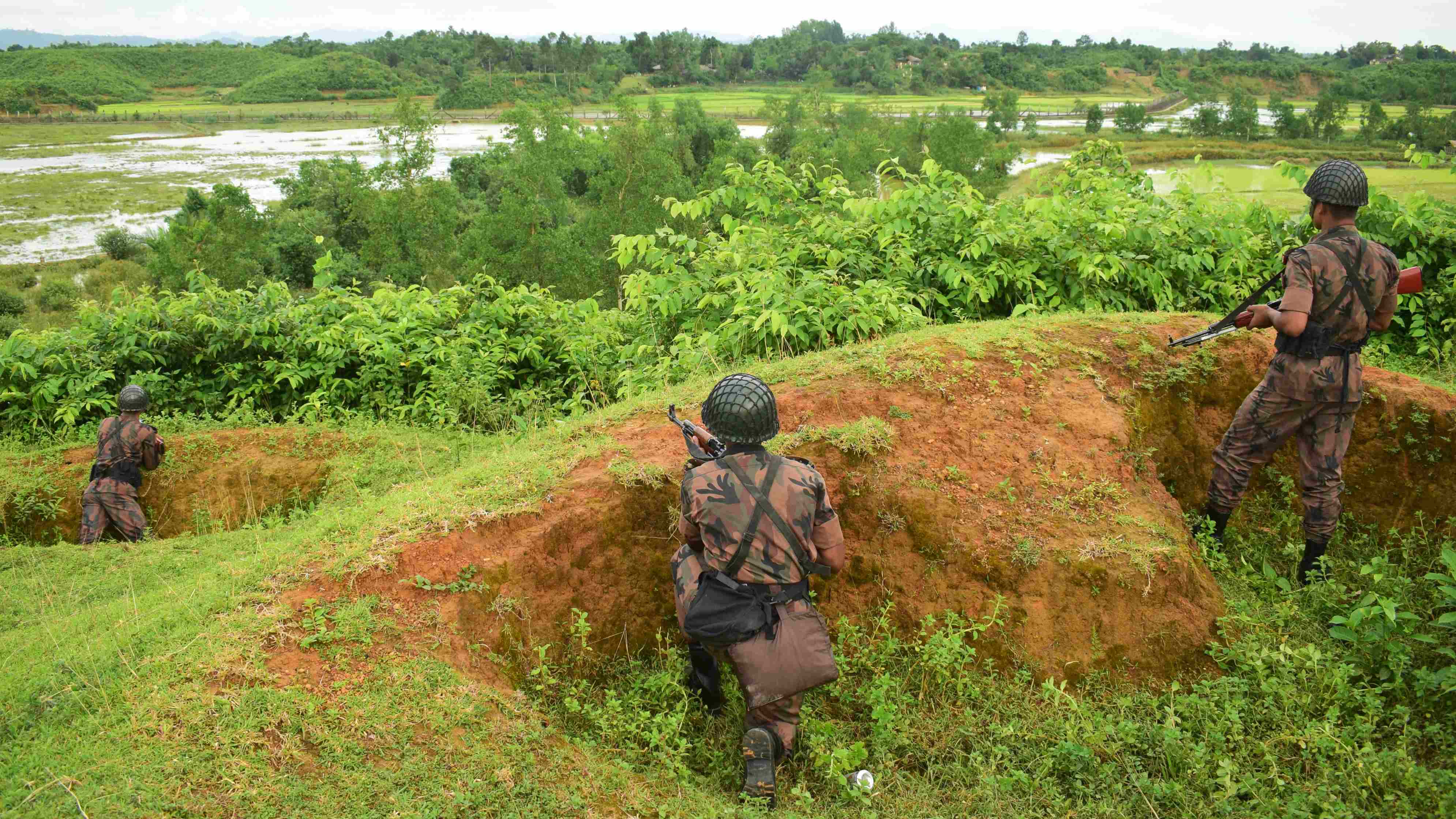The war of words between Bangladesh and Myanmar has escalated lately over Myanmar's military action near border areas, which has seen a mass exodus of Rohingya Muslims in recent weeks, prompting speculation as to whether the deterioration in relations may lead to a possible military conflict between the two Asian neighbors.
Bangladesh on Friday strongly protested the “repeated violation” of its airspace by Myanmar military drones and helicopters and warned that any more “provocative acts” could have “unwarranted consequences”.
Dhaka also summoned Myanmar’s envoy and handed over a note of protest to him, according to a statement issued by Bangladesh’s Ministry of Foreign Affairs.
Dhaka protests air space violations
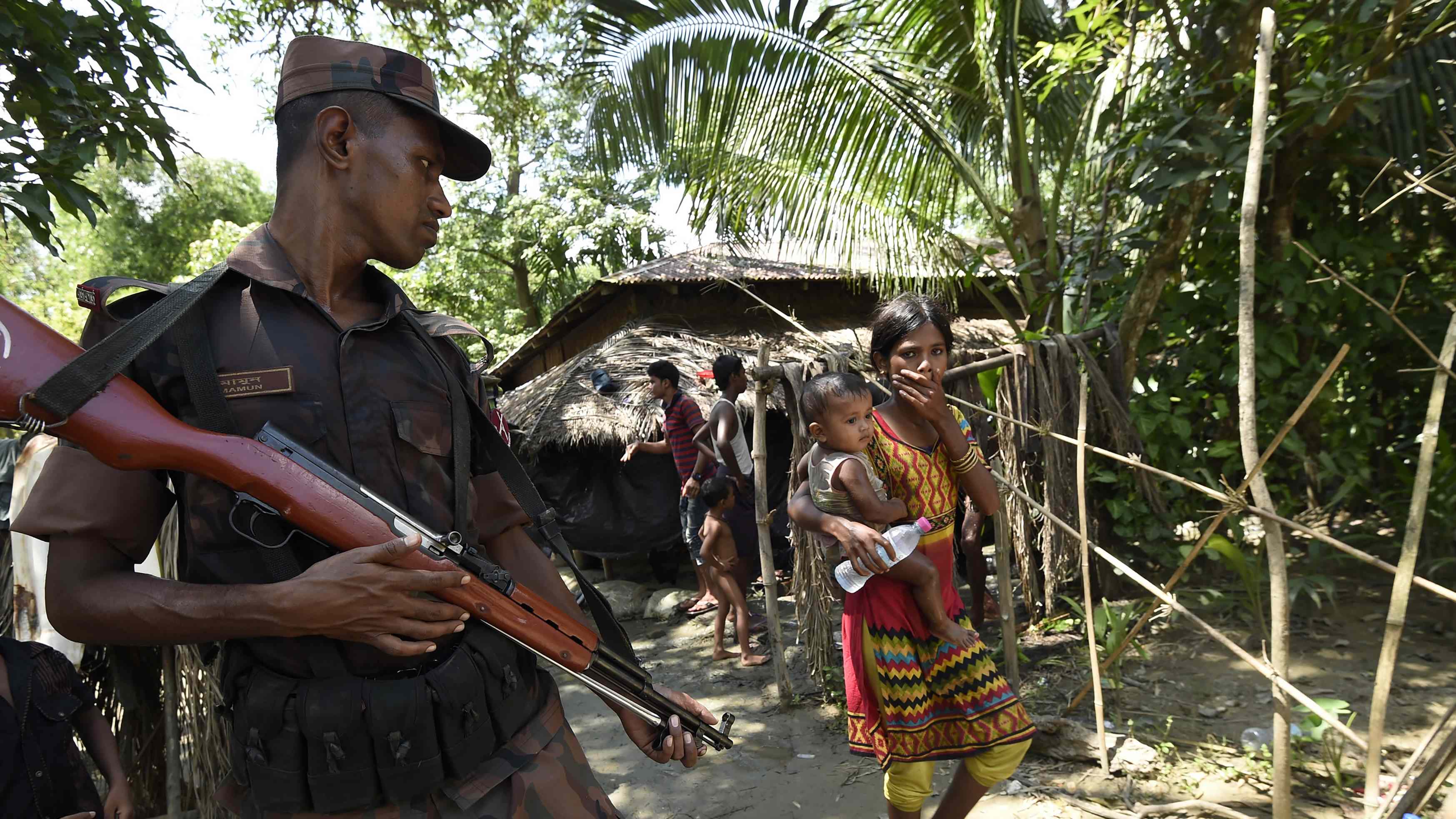
A Bangladeshi border guard looks at Rohingya refugees at the Jalpatoli refugee camp in the no-man's land area between Myanmar and Bangladesh, near Gumdhum village in Ukhia, September 16, 2017. /AFP Photo
A Bangladeshi border guard looks at Rohingya refugees at the Jalpatoli refugee camp in the no-man's land area between Myanmar and Bangladesh, near Gumdhum village in Ukhia, September 16, 2017. /AFP Photo
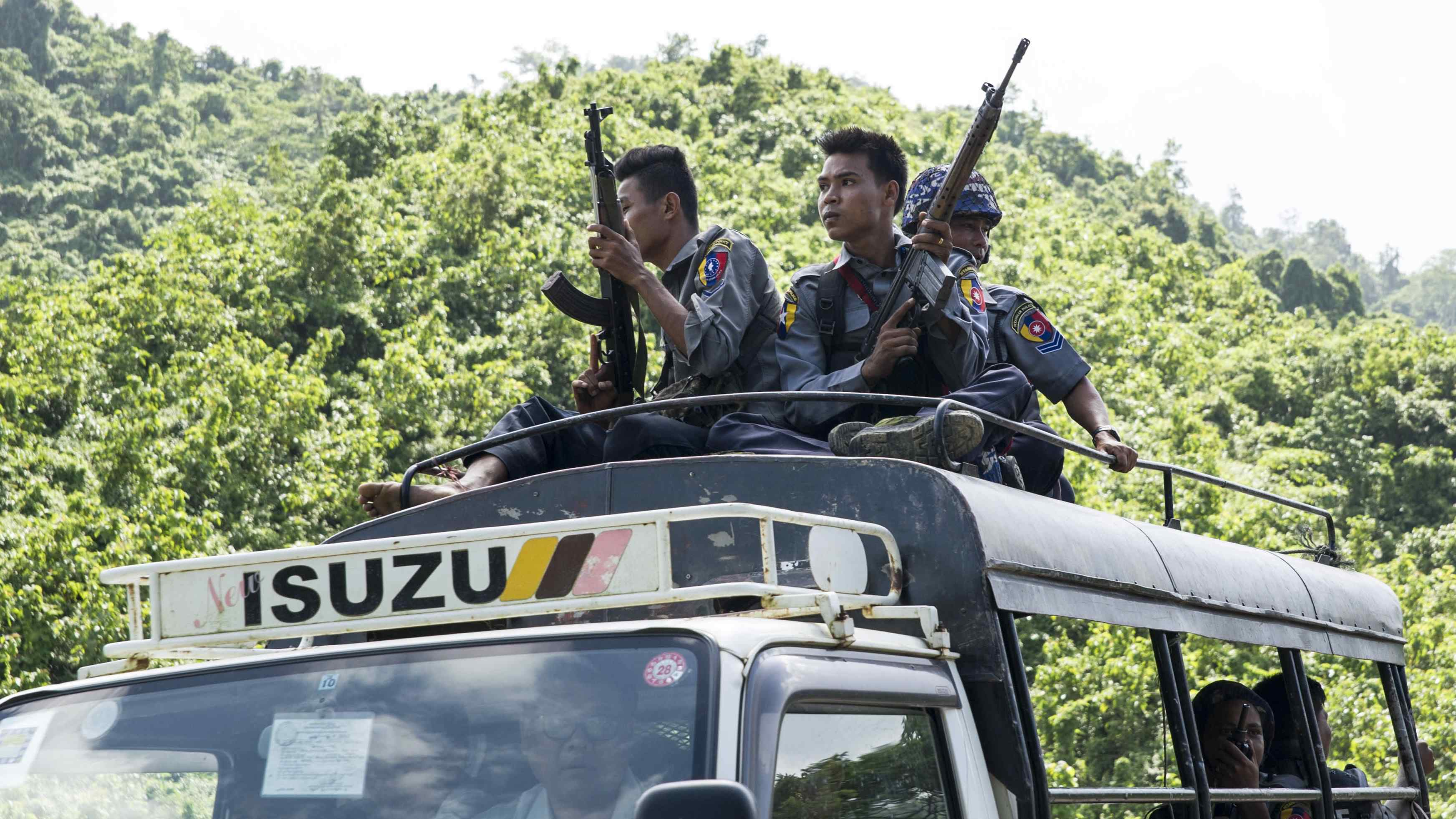
Myanmar police escorting staff from the UN and international non-governmental organisations following their visit to a conflict area, at a checkpoint near the entrance of Maungdaw township in Myanmar's Rakhine State, August 28, 2017. /AFP Photo
Myanmar police escorting staff from the UN and international non-governmental organisations following their visit to a conflict area, at a checkpoint near the entrance of Maungdaw township in Myanmar's Rakhine State, August 28, 2017. /AFP Photo
“Bangladesh strongly protested the instances of violation of her air space by Myanmar military drones and helicopter on September 10, 12 and 14, 2017. The Charge d’ Affaires of the Myanmar Embassy in Dhaka met the Director General (South East Asia Wing) of the Ministry of Foreign Affairs this evening (September 15) at the Ministry where a protest note was handed over to him,” the statement said.
Dhaka stated that there have been several instances of air space violations since August 25, when Myanmar began its military offensive against insurgents in northwestern Rakhine State, resulting in nearly 400,000 Rohingya Muslim refugees crossing into Bangladesh.
“Bangladesh expressed deep concern at the repetition of such acts of provocation and demanded that Myanmar takes immediate measures to ensure that such violation of sovereignty does not occur again. Bangladesh also mentioned that these provocative acts may lead to unwarranted consequences,” the ministry statement said.
Myanmar’s presidential spokesman Zaw Htay responded on Saturday saying there was no evidence of any violations. He said however that the matter was being investigated.
Myanmar would check any information that Bangladesh provided, Htay told Reuters, adding, "Our two countries are facing the refugee crisis. We need to collaborate with good understanding."
Dhaka: Myanmar's act a 'genocide'
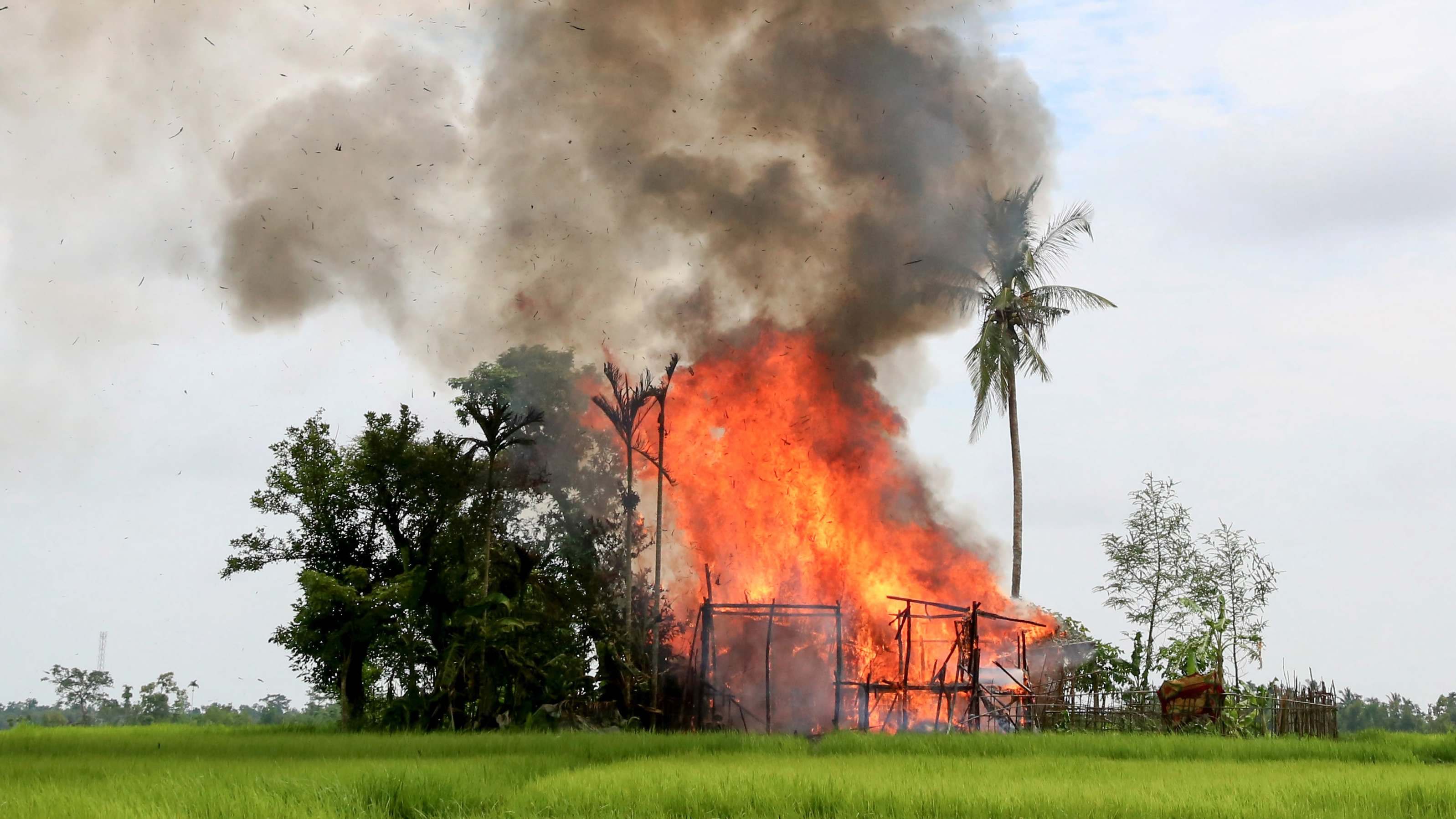
A house burns in Gawdu Tharya village near Maungdaw in Myanmar's Rakhine State, September 7, 2017. /AFP Photo
A house burns in Gawdu Tharya village near Maungdaw in Myanmar's Rakhine State, September 7, 2017. /AFP Photo
Last week, Bangladesh slammed the Myanmarese offensive against Rohingya insurgents as “genocide”. The United Nations has branded Naypyidaw’s action as a "textbook example of ethnic cleansing".
"The international community is saying it is genocide. We also say it is genocide," Bangladesh’s Foreign Minister A H Mahmood Ali told reporters after briefing Western and Arab diplomats and heads of UN agencies in Dhaka on September 10.
He told the diplomats that some 300,000 Rohingya had fled to Bangladesh in the past two weeks, taking the total number of refugees in the country to over 700,000.
This is creating huge challenges for Bangladesh in terms of providing shelter as well as other humanitarian assistance "It is now a national problem," Ali declared.
Bangladesh has for decades faced influxes of Rohingya fleeing persecution in Buddhist-majority Myanmar, where they are regarded as illegal migrants.
Bangladesh was already home to 400,000 Rohingya before the latest crisis erupted last month.
The Myanmar security forces and Rakhine Buddhist vigilantes responded with what rights monitors and fleeing Rohingya say is a campaign of violence and arson aimed at driving out the Muslim population.
Bangladesh restricted the movement of Rohingya refugees on Saturday, banning them from leaving overcrowded border areas where they are living in squalid conditions.
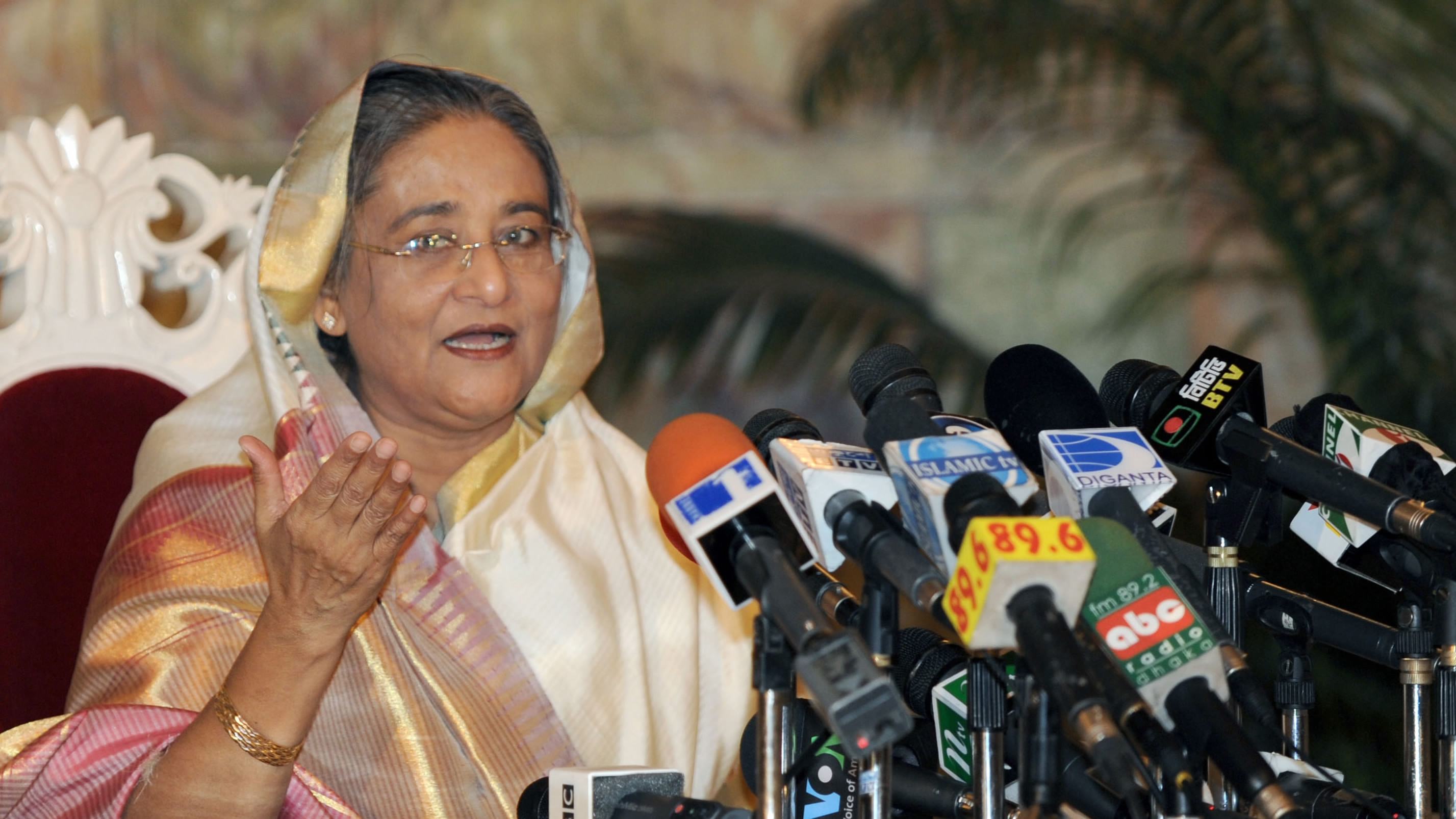
Bangladesh's Prime Minister Sheikh Hasina headed on Saturday for the UN General Assembly to plead for global help on the Rohingya refugee crisis. She is expected to urge the global community to put pressure on Myanmar to take all Rohingya refugees back after stopping its "ethnic cleansing." /AFP Photo
Bangladesh's Prime Minister Sheikh Hasina headed on Saturday for the UN General Assembly to plead for global help on the Rohingya refugee crisis. She is expected to urge the global community to put pressure on Myanmar to take all Rohingya refugees back after stopping its "ethnic cleansing." /AFP Photo
The tough new measures came as Bangladesh's Prime Minister Sheikh Hasina headed on Saturday for the UN General Assembly to plead for global help.
Hasina will urge the global community to put pressure on Myanmar to take all Rohingya refugees back after stopping its "ethnic cleansing”, her press secretary, Ihsanul Karim, told Reuters.
A commission led by former UN chief Kofi Annan last month said Myanmar must scrap restrictions on movement and citizenship for its Rohingya minority if it wants to avoid fueling extremism and bring peace to Rakhine State.
Ali called on the international community to urge the Myanmar government to immediately implement the recommendations of the commission's report "in its entirety".
Bangladesh has said all refugees must go home. Myanmar has said it will take back those who can verify their citizenship but most Rohingya are stateless.
'Bengalis', not Rohingya: Army chief
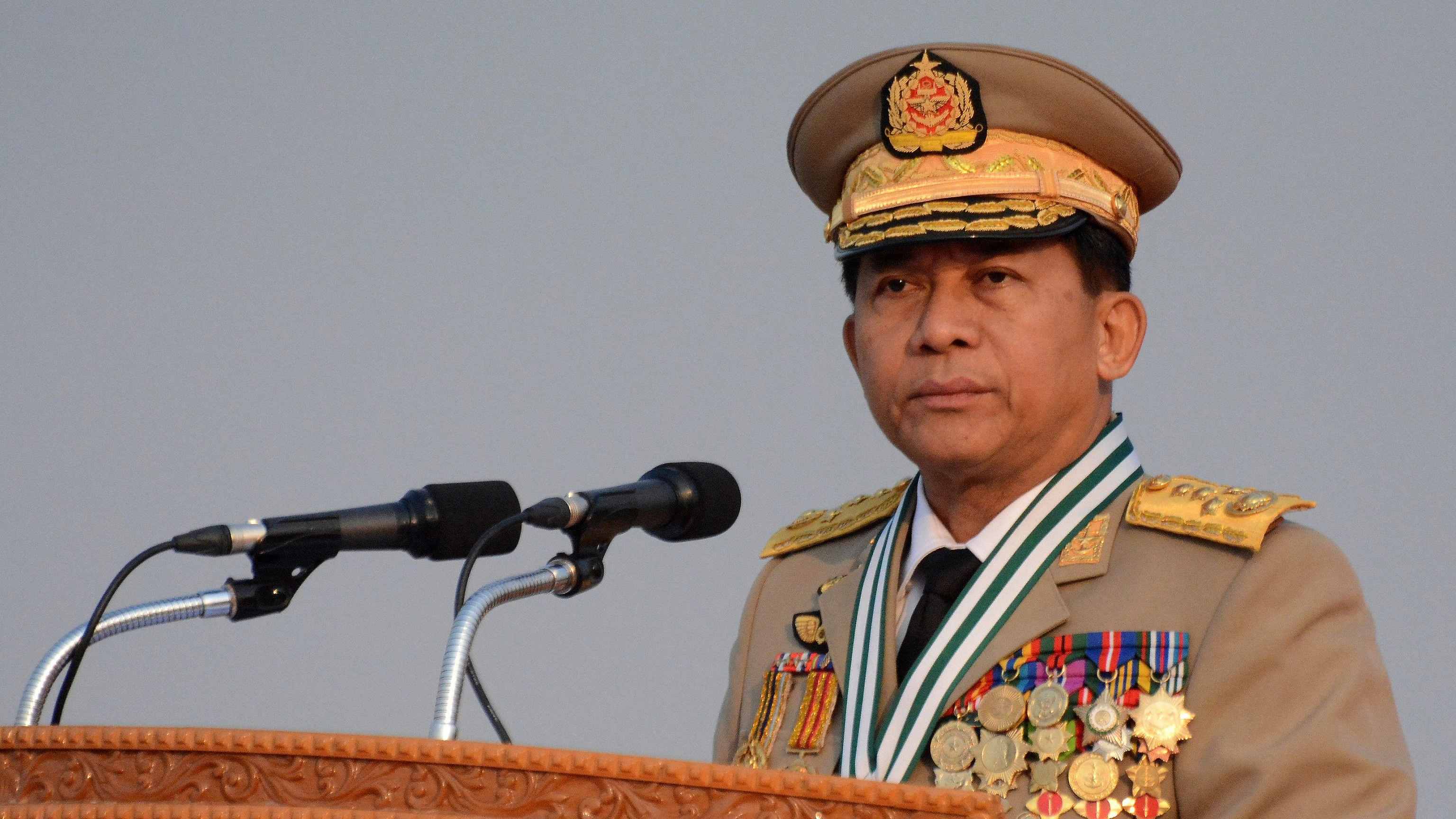
Myanmar's Army Chief General Min Aung Hlaing urged the country to unite over the issue of the Rohingya, asserting the Muslim minority group has no roots in the country, and insisting they be called "Bengalis", in a Facebook post on September 16, 2017. /AFP Photo
Myanmar's Army Chief General Min Aung Hlaing urged the country to unite over the issue of the Rohingya, asserting the Muslim minority group has no roots in the country, and insisting they be called "Bengalis", in a Facebook post on September 16, 2017. /AFP Photo
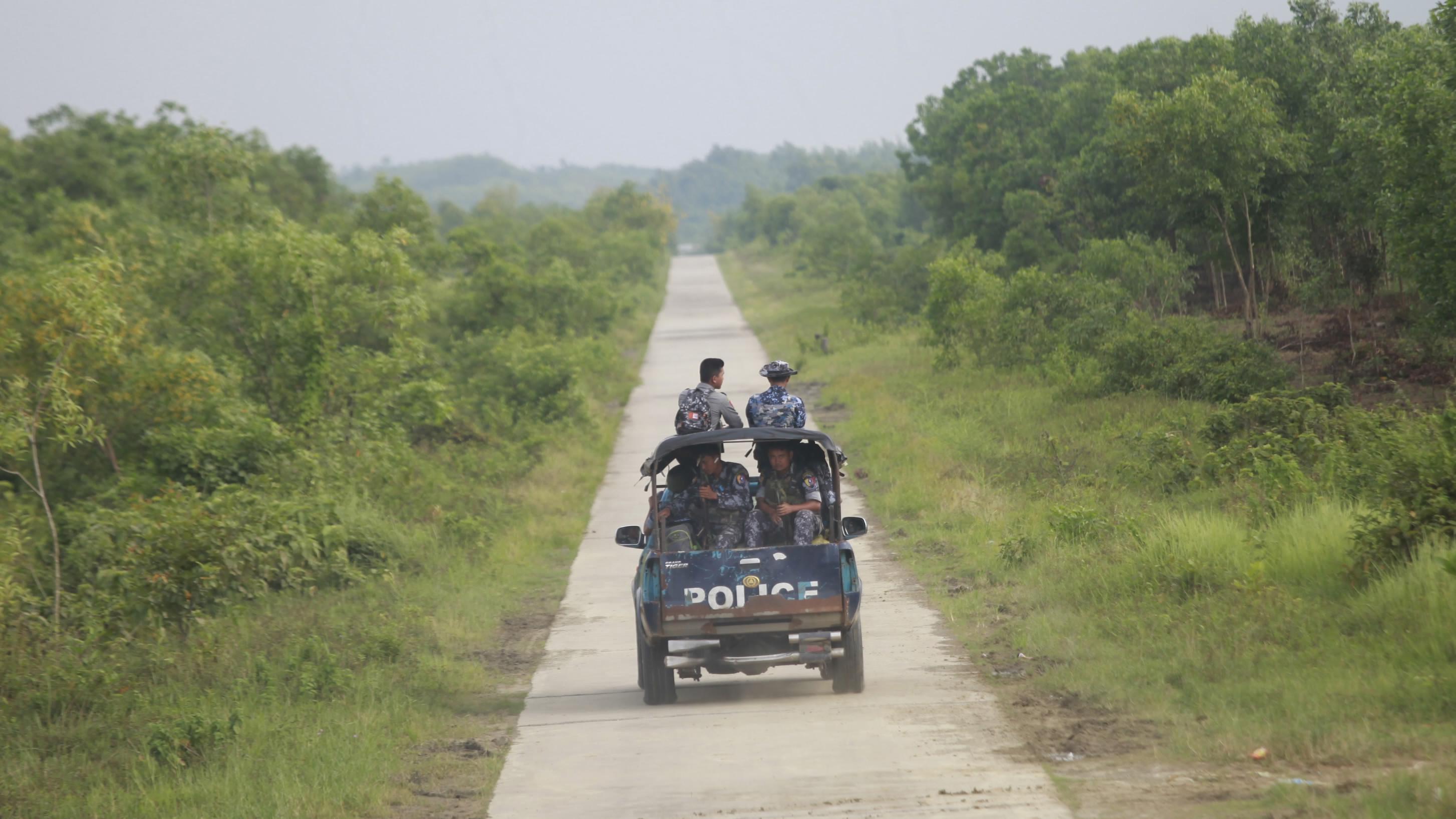
Myanmar border guard personnel ride on a police vehicle during a patrol in the southern Maungdaw area of Myanmar's Rakhine State, September 4, 2017. /AFP Photo
Myanmar border guard personnel ride on a police vehicle during a patrol in the southern Maungdaw area of Myanmar's Rakhine State, September 4, 2017. /AFP Photo
Meanwhile, Myanmar's army chief on Saturday urged the country to unite over the "issue" of the Rohingya, asserting the Muslim minority group has no roots in the country, and which his troops are accused of systematically purging.
The military says its "clearance operations" in northern Rakhine State are aimed at taking out Rohingya militants who attacked police posts on August 25.
The status of the Muslim minority has long been a controversial topic in Myanmar. Many in the Buddhist-majority nation view the community as foreign transgressors from Bangladesh and deny the existence of a Rohingya ethnicity, insisting they be called "Bengalis".
General Min Aung Hlaing vociferously propagated that view in comments posted on his official Facebook page on Saturday.
"They have demanded recognition as Rohingya, which has never been an ethnic group in Myanmar. [The] Bengali issue is a national cause and we need to be united in establishing the truth," the post said.
The defense of his army's operations comes amid strident global condemnation of the violence, which has left Bangladesh with the overwhelming task of providing shelter and food to a rising tide of desperate refugees.
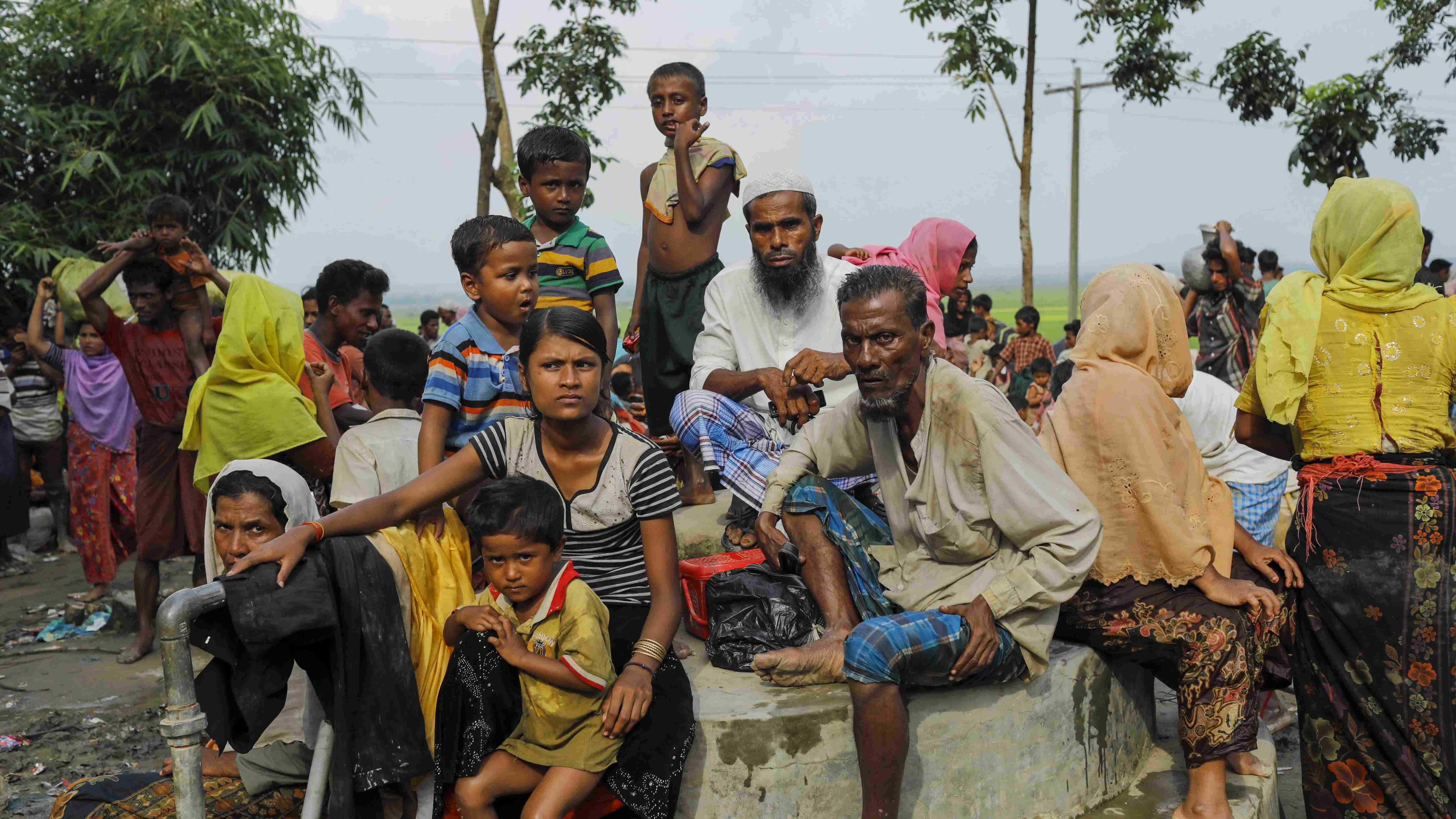
Rohingya refugees from Myanmar's Rakhine State take rest at the Khanchon border crossing near the Bangladeshi town of Teknaf, September 5, 2017. /AFP Photo
Rohingya refugees from Myanmar's Rakhine State take rest at the Khanchon border crossing near the Bangladeshi town of Teknaf, September 5, 2017. /AFP Photo
The Bangladeshi foreign minister accused Myanmar of running a "malicious propaganda" campaign to term the Rohingya as "illegal migrants from Bangladesh" and the militants as "Bengali terrorists".
He said the Rohingya Muslims in Rakhine are a "mixed group of people" with a history dating back 1,500 years and ancestors including Arabs and Indians. Ali described actions following the militant attacks on security forces on August 25 as "revenge" by Myanmar troops.
"We did not create the problem. Since the problem started in Myanmar, that's why they should resolve. We have said we'll help them," he said.
Meanwhile, Amnesty International and border officials in Bangladesh said the Myanmar military had planted landmines on the path of the fleeing Muslims, causing many of them to sustain serious wounds or lose body parts.
The Myanmar government claims 432 people have been killed in the military offensive, but the UN and rights groups give much higher figures.
Three days after the outbreak of violence, the European Rohingya Council said between 2,000 and 3,000 Muslims were killed in Rakhine state. The UN also said last week that 1,000 people may have died.
Suu Kyi to break her silence
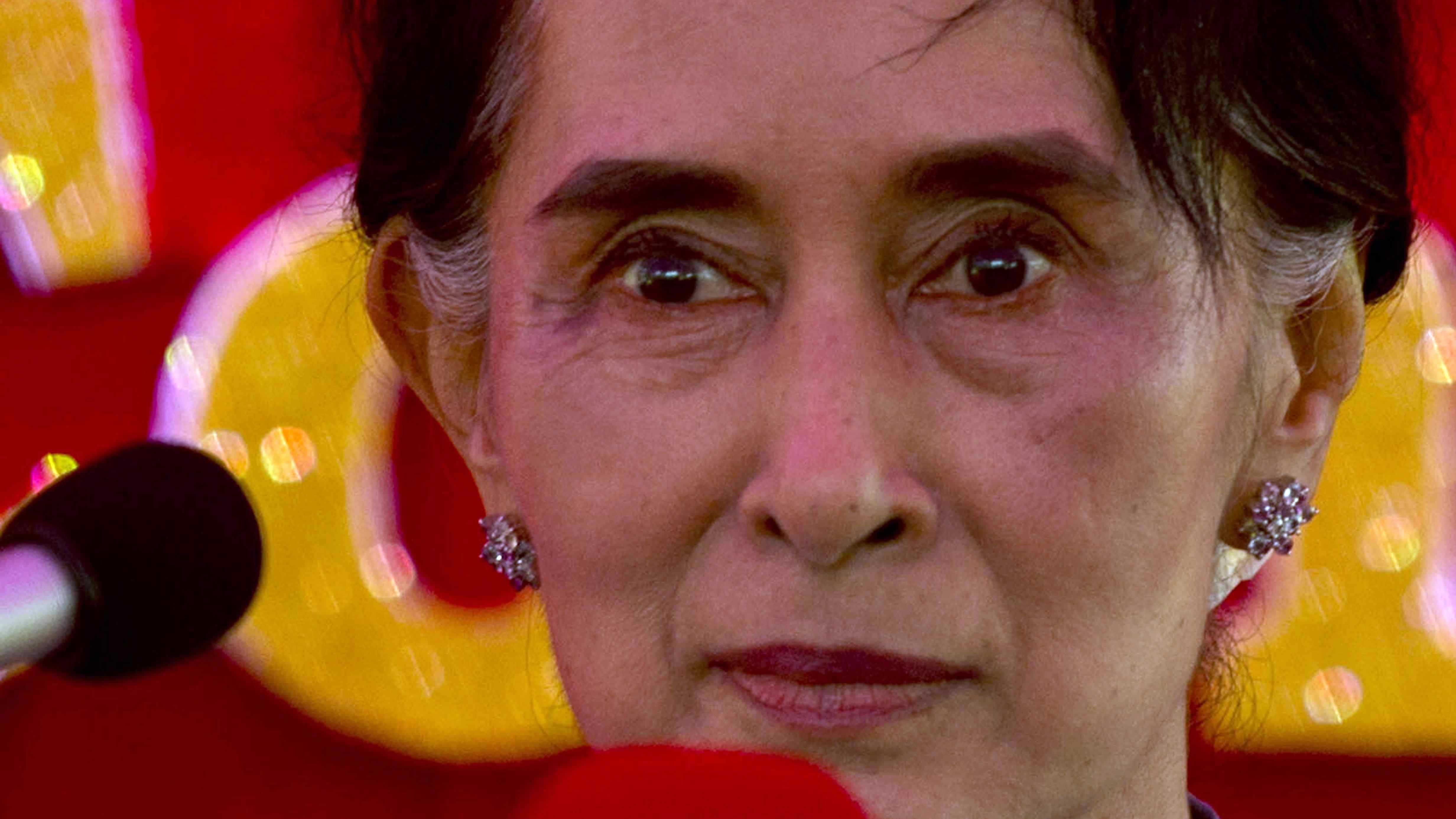
All eyes will be on Myanmar leader Aung San Suu Kyi as she breaks her silence on the Rohingya crisis for the first time on September 19, 2017. The Nobel laureate's televised address comes ahead of a UN General Assembly meeting in which Myanmar is expected to come under fire over its handling of the unfolding human tragedy. /AFP Photo
All eyes will be on Myanmar leader Aung San Suu Kyi as she breaks her silence on the Rohingya crisis for the first time on September 19, 2017. The Nobel laureate's televised address comes ahead of a UN General Assembly meeting in which Myanmar is expected to come under fire over its handling of the unfolding human tragedy. /AFP Photo
The statement comes just days ahead of Myanmarese leader Aung San Suu Kyi’s much-awaited speech on the crisis. All eyes will be on the Nobel laureate as she addresses the nation on the crisis for the first time on Tuesday.
Suu Kyi took office last year as Myanmar's first civilian leader after 50 years of junta rule. The much-anticipated speech, being dubbed as Suu Kyi’s biggest during her time in office, will see the Myanmarese leader break her silence on the unfolding human tragedy. The speech is also being seen as Suu Kyi’s cautious bid to soothe global outrage while not upsetting the army’s vociferous stand.
In an interview with the BBC, UN Secretary General Antonio Guterres said the stakes were high for Tuesday's speech, calling it a "last chance" to stop the unfolding humanitarian calamity.
"If she does not reverse the situation now, then I think the tragedy will be absolutely horrible, and unfortunately then I don't see how this can be reversed in the future," he said.
Suu Kyi's televised address – likely at least in part to be in English – comes ahead of a meeting at the UN General Assembly in which Myanmar is expected to come under scathing criticism over the crisis.
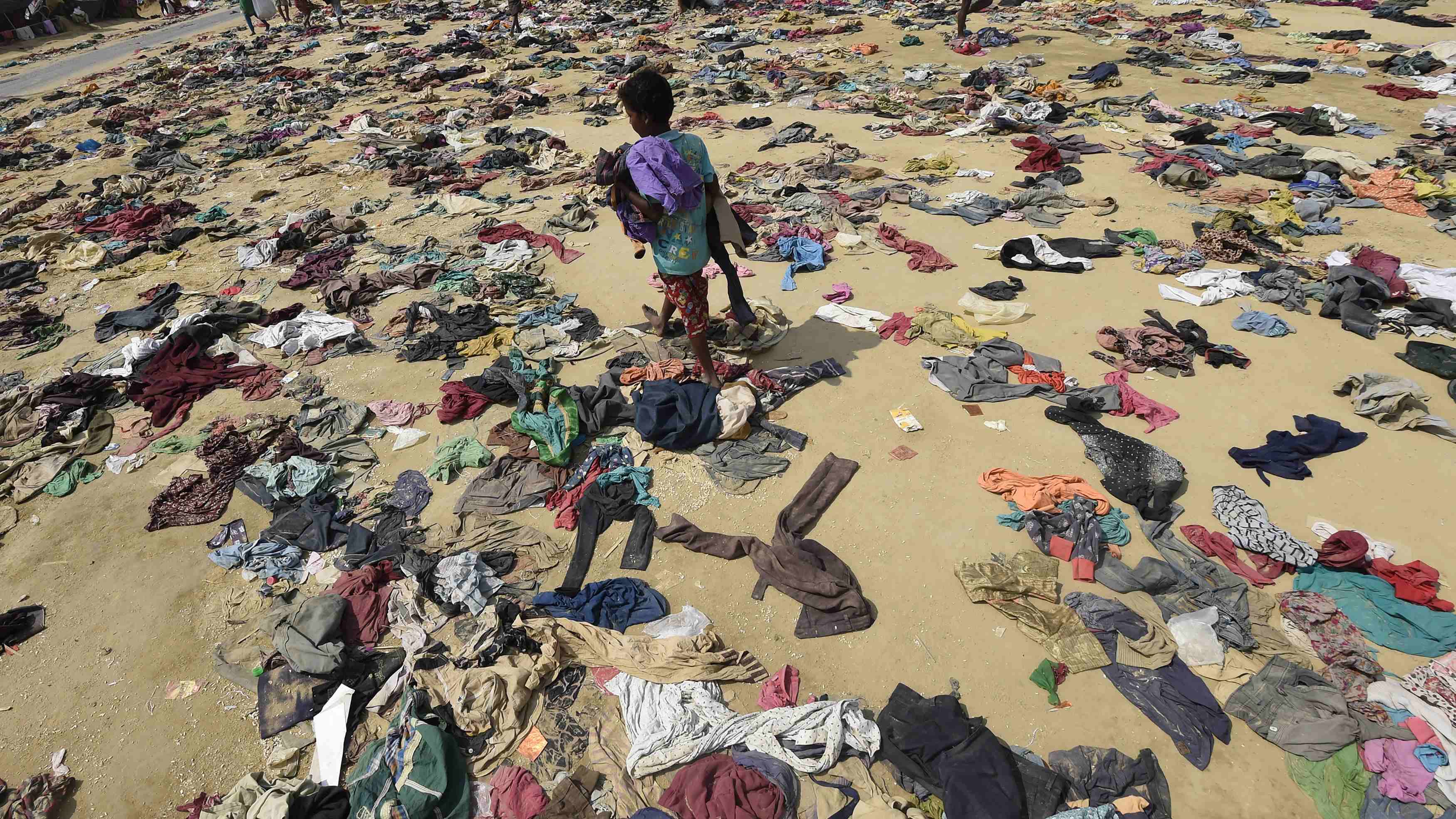
Discarded clothing on the ground at the Bhalukali refugee camp near Ukhia, in Bangladesh, September 16, 2017. /AFP Photo
Discarded clothing on the ground at the Bhalukali refugee camp near Ukhia, in Bangladesh, September 16, 2017. /AFP Photo
But analysts say her power to check the military is limited. "She's signalling that her chief priority is the relationship between the government and military and that the pogrom is secondary to that," Francis Wade, author of "Myanmar's Enemy Within: Buddhist Violence and the Making of the Muslim Other", was quoted as saying in an AFP report.
"This obviously raises questions about the quality of leadership she seeks to bring, but also that the political game in Myanmar is worth the sacrifice of entire communities."
Suu Kyi has come under fire for remaining silent on the Rohingya crisis, with thousands of critics petitioning the Nobel Institute to revoke her peace prize.
Under pressure, the committee that oversees the Nobel Peace Prize had to issue a statement on September 8 saying the 1991 prize awarded to Suu Kyi cannot be revoked.
"It is not possible to strip a Nobel Peace Prize laureate of his or her award once bestowed," Olav Njolstad, head of the Norwegian Nobel Institute, said.
"None of the prize awarding committees in Stockholm and Oslo has ever considered revoking a prize after it has been awarded."
(With input from agencies)

